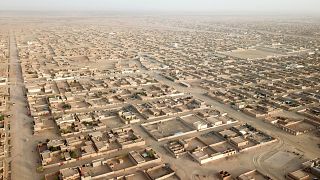Business Africa
Tunisia is looking to an economic overhaul before resuming loan talks with the International Monetary Fund. Economy and Finance Minister, Ali Kooli says he’s committed to taking what he calls ‘’unpopular steps’’ to salvage the economy.
It is not clear what the steps are, but the state news agency reports of a government proposal to reduce working hours for public sector workers. It forms part of efforts to cut public spending, one of the recommendations by the IMF.
Protests in Tunisia over unemployment and poor living conditions have plagued the country for more than a month. And they could get even worse. Ali Kooli told reporters in early February he is fully committed to taking the unpopular steps. Such reforms would limit the public sector wage bill, cut subsidy spending, and restructure loss making state-owned companies. The country has been hard hit by the coronavirus pandemic and in 2020, its economy contracted 8.2 per cent, with both poverty and unemployment rising and youth unemployment at 36.5 per cent.
In January, the IMF urged Tunisia to cut spending on salaries and handouts to help rein in the budget deficit. Though such measures would appease investors and lenders. It could add fuel to the protests, which began on the 10th anniversary of the start of the Arab spring.
In the meantime, authorities are considering a maiden sovereign sukuk issue or turning to financial markets in the Middle East, Asia or even the U.S. to help plug a budget deficit projected at between $4 billion and $5 billion in 2021, said Kooli, 56, a former banking executive.
Dr. Hakim Ben Hammouda is Tunisia’s former Minister of Economy and finance. He tells Business Africa: ‘’ I think the social situation in Tunisia is very difficult and is getting worse with the social impact of the pandemic. This is the responsibility of the government. I think the government should explain to the IMF that at least for 2021, the priority is not going to be the major economic reform.’’
Borders continue to be shut in Africa to battle against the pandemic. In Togo, the move has put the economy under immense pressure. At the Togolese-Beninese border, merchants are still counting their losses. Because their activities have significantly plummeted since 2020. Business Africa talks to a local economist.
Blaise Amoussou-Kpeto says a resilient economic plan is crucial to get the country out of the woods. "We have to work on the first phase. This is the resilience of the economy. We need to be able to build on the experience we've had to end the crisis quickly so that the economy can get back on its feet", he said.
And in the north of Ivory Coast, a cooperative of farmers is hoping to make the country a top honey producer in the world. The world’s top cocoa producer has begun modern beekeeping business. Honey, essential oils and bee wax are just some of the by-product from the insect that are on demand in this West African nation.
When farmers in the heart of the world's top cocoa producer begun taking up honey-making to supplement their income, they realized their primary crops did better when pollinated by the bees.
"Beekeeping in a healthy environment allows humans to earn twice as much. The environment is positively impacted, no pesticides. The farmer has a much higher yield in what he does. Everything that has seeds, everything that has fruit, he earns a lot and he also earns the money from the honey", said Mathieu Koffi, Co-director of the company "Le bon miel de Côte d'Ivoire".
In the economic capital, Abidjan, it is common for street vendors to sell honey mixed with water and sugar. That's why outlets like this advice patrons to buy directly from them.
"I specifically came to buy this honey because it tastes very good and I find everything I am looking for in it, I mean, in this honey I find the taste. In this honey I find the creamy part and then just by looking at it, I can see a certain healthiness in this honey", Edith Koné, a customer said.
A hive costs 53 euros. When clothing and basic equipment is added, it cots 99 euros. The price of a kilogram of honey ranges from 4 euros to 15 euros. Spin off products like bee wax, and essential oils are also in demand. Getting statistics on the beekeeping business is complicated at the national level.
President of the Agricultural Platform of Ivory Coast, only estimates that 30 tonnes of honey are produced each year.











Go to video
Paraguayan town celebrates vibrant Kamba Ra'anga festival with masks, fire and tradition
00:50
Ons Jabeur retires from Wimbledon Opener due to breathing issues
01:54
South Africa's independent mechanics join forces to compete with big companies
01:09
Former Tunisian president Moncef Marzouki sentenced to 22 years in absentia
01:47
Chinese city of Xuchang is world's biggest producer of wigs
01:15
U.S. considers adding more African countries to travel ban